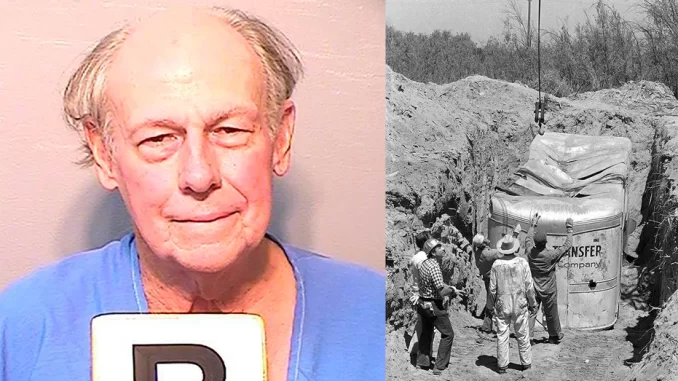

This Oct. 29, 2021, photo provided by the California Department of Corrections and Rehabilitation shows Frederick Woods; In this July 20, 1976, photo, officials remove a moving van buried at a rock quarry in Livermore, Calif., in which 26 Chowchilla school children and their bus driver, Ed Ray were held captive. (Associated Press)
OAN Newsroom
UPDATED 9:05 AM PT – Friday, August 19, 2022
A man who kidnapped a school bus full of children in 1976 was granted parole after serving more than 40-years behind bars. According to the California Department of Corrections and Rehabilitation, Frederick Woods is set to become a free man.
The 70-year-old was granted parole on Tuesday. Prior to his release, his request had been rejected 17 times. Woods was convicted for the crime alongside his two accomplices, brothers Richard and James Schoenfeld. Richard Schoenfeld was given parole in 2012 and his brother James was released in 2015.
The three men kidnapped a bus full of 26 children and their driver at gunpoint. The crime occurred near Chowchilla, California. The group drove the bus driver and children, who were aged five to 14, about 100-miles to a remote area near San Francisco. The men ordered them to pile into a moving van and then buried them six feet underground. They then planned to ask their families for five million dollars in ransom. The kids and their bus driver, Ed Ray, were able to escape after stacking mattresses to the surface. They dug themselves out 16-hours later.
Governor Gavin Newsom’s (D-Calif.) late father, Judge William Newsom, was on the appeals court that overturned all three life sentences. He said that the men caused no serious bodily injury and should have a chance for parole. However, Woods has continued “to engage in financial related misconduct in prison.”
Fredrick Woods, convicted in 1976 for the Chowchilla school bus kidnapping will be set free, according to the latest decision by parole commissioners. @KMPHFOX26 Here’s the response from the Madera County District Attorney’s Office: pic.twitter.com/ztfqddgZs6
— Mayra Franco (@MayraFrancoTV) August 18, 2022
In the meantime, despite this being the biggest mass kidnapping in US history, several victims have supported Woods release. Kidnap survivor, Rev. Larry Park, has forgiven Woods for his crime.
“There is nothing that is going to bring closure for any of us,” Park said. “So whether he stays in jail or gets out, if he dies in jail, there’s no more sense of closure in that.”
At his last hearing, Woods said he was deeply remorseful. Still, word of his release left many survivors in shock. Due to the fact that this is not a murder case, Governor Newsom could not overrule the decision. Newsom can only send the grant to the parole board for review.

